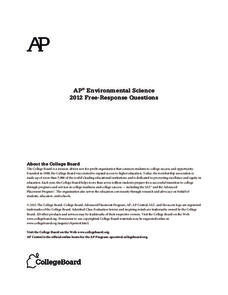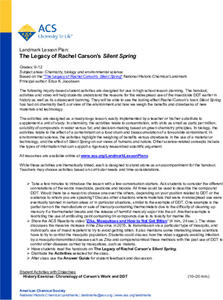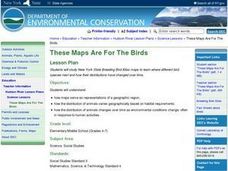Curated OER
Pesticide Prevalence
Learners investigate the prevalence of pesticides in their communities by
searching their homes, visiting local stores and talking to extended family and friends. They conduct their search by classifying pesticides based on the pests...
Curated OER
Pesticide Use: Environmental Awareness and Impact of Conservation Organizations
Eleventh graders examine the history of public concerns associated with pesticide use, and identify conservation organizations that examine pesticide use. They write reports to evaluate conservation organizations.
Curated OER
Lithosphere and Groundwater
Focusing on the quality of our water sources, these slides are full of information about the aspects of our soil and groundwater that may affect pollution. The leaching of pollutants and their impact on health is explained. ...
Curated OER
The Influence of Human Activity on the Environment
The surge in human population in the last 2,000 years, due in large part to better health care, has brought a surge in the demand for resources and in pollution. The graphics, photographs, and real-life examples in a thought-provoking...
College Board
2012 AP® Environmental Science Free-Response Questions
Sometimes solving one problem leads to another. Scholars respond to questions about fracking to harvest natural gas and other environmental related topics. The resource provides items released from the 2012 AP® Environmental Science exam...
American Chemical Society
The Legacy of Rachel Carson’s Silent Spring
How do we protect crops and protect the environment at the same time? Using reading materials, learners explore the history of the use of pesticides and biocides. They create a timeline and then explore the current practices.
EngageNY
End of Unit Assessment: Analyzing the Structure of Chávez’s Wrath of Grapes Speech
César Chávez gave his 1986 "Wrath of Grapes" speech to educate consumers about pesticide use. Scholars complete an end of unit 2 assessment, applying what they learned throughout the unit to a new text. They then analyze the structure of...
Curated OER
Natural Gardening
Students study the effect of pesticides on plants and insects. In this gardening lesson, students discuss the importance of insects. They define pesticides, evaluate their effectiveness and the problems they might cause. Students...
Curated OER
Operation Mexfly
Students research information about pesticides. Students discuss the history of the Mexican fruit fly. They experiment to discover malathion concentration levels in organisms. Students explore the effect of toxins at the top of the...
Curated OER
Food Safety-Consumers Need the Facts
Students begin by completing a survey asking them to rank their concerns about commercially prepared foods. They develop a definition of relative risk, and complete the "Pro or Con" worksheet. Students work in groups to make a study of...
Curated OER
Arsenic and Lead Scavenger Hunt
Health wizards read and discuss an article about lead contamination then come up with a plan to help solve the problem. They get into groups to develop a community solution within the parameters of a budget, feasibility, and the source...
Cornell University
Beneficial Insects
A lot of people think of insects as pests. But actually, some insects are beneficial because they get rid of pests! After learning about beneficial insects, class members research given insects to find out if they are pests or predators.
Curated OER
Organic Feud
Students examine possible pesticide exposure in their fruit and vegetable consumption. They compile fact sheets exploring various organic food issues and interview their parents about the food choices they make for their Students.
Curated OER
Water Pollution
Get your scientists engaged in both recall and life application responses after reading a selection from a McGraw Hill science text (not included). Based on chapter 14, this water pollution worksheet has students review where water...
Curated OER
Nutrition: It's In Your Hands
Fourth graders use this lesson to focus on their health, nutrition and the state of the environment. In groups, they examine the various types of land, water and air pollutants and compare and contrast a food chain with and without a...
Curated OER
These Maps are for the Birds
Learners identify and study New York State Breeding Bird Atlas maps to learn where different bird species nest and how their distributions have changed over time. They also identify how maps serve as representations of a geographic...
Curated OER
Paying With Their Health
Students consider the plight of immigrant workers. In this undocumented immigrant lesson, students compare the worker of the Industrialization era to the undocumented immigrant workers of today. Students read and discuss literature about...
California Academy of Science
Pollution in Our Watershed
The concept of a how pesticides and other chemicals pass through a watershed can be difficult for younger learners to grasp without a concrete example. In the activity here, some blank paper, markers, and a spray bottle are all you need...
Curated OER
Peregrine Falcon
Young environmentalists study the effects that pesticides have on birds, such as the peregrine falcon. They also look at predator/prey interactions. Some wonderful in-class activities accompany an inventive instructional activity. After...
EngageNY
Close Reading and Gathering Evidence from Frightful’s Mountain and “Welcome Back”
Where did the falcons go? Scholars read the article Welcome Back which describes the disappearance of falcons due to the use of pesticides. During a second read, learners annotate the text by marking unfamiliar words and facts about...
Curated OER
Just Spray 'Em!?
High schoolers read the label of an insecticide and identify pertinent information. They tell that the higher the LD50 the less toxic the chemical. Students begin to extrapolate the impact of pesticide use beyond the death of the insect.
Curated OER
Weeds on the Windowsill
Students study farming and reasons to control weeds. They examine pesticides necessary for the control of weeds and the damage to the environment. Through experimentation, students plant seeds in different soils and determine if seeds...
Curated OER
Silent Spring
Students read background information about Rachel Carson found on the listed website links. They analyze and answer questions about her work and how it is linked to science then they research pesticide usage and alternative methods.
Curated OER
When Is a Pest an Insect?
Learners view the importance of insects as pollinators. They are now posed with the problem--those insects are nice--but insects are pests right? Students explore their description of pests and pesticides.
Other popular searches
- Pesticides Food
- Harmful Pesticides
- Pesticides and Their Harm
- Pollution Pesticides
- Comparing Pesticides
- Pesticides for the Farm
- Agriculture Pesticides
- Pesticides and the Danger
- Synthetic Pesticides
- Pesticides and Insect
- Chemical Elements Pesticides
- Herbicides and Pesticides

























